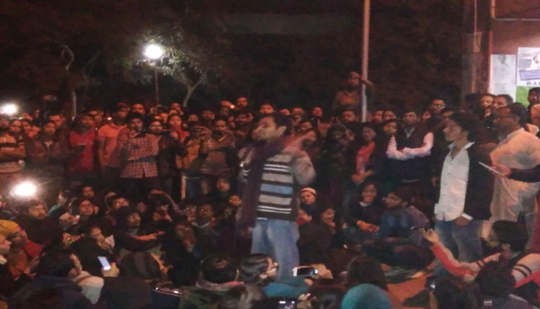New Delhi, Feb 22: A producer with Zee News has resigned from the TV channel after expressing reservations over its “biased coverage” of the JNU protests and the sedition charge against the university's students union leader.

Vishwa Deepak, an output producer, was part of the team that produced a Zee News show on the night of February 9, when alleged anti-India slogans were raised in the JNU campus during a protest against Parliament convict Afzal Guru's hanging.
Footage telecast on Zee News formed the basis of the Delhi police's suo motu FIR on the incident following which JNU students union president Kanhaiya Kumar was arrested.
In a letter to Zee News on Sunday, Deepak stated that the channel had broadcast a video of students raising slogans with a caption that said Pakistan Zindabad'. “The video which had no “Pakistan Zindabad” slogans in it, we played repeatedly to spread madness. How did we establish that Kanhaiya and his associates were chanting slogans when all we heard were voices coming from the darkness. Our biases made us hear Bhartiya Court Zindabad as Pakistan Zindabad,” stated his letter.
Speaking to The Indian Express, Deepak said Zee News aired footage of students chanting Pakistan Zindabad' repeatedly, but it did not have any such slogans in it. “We heard inaudible slogans from the grainy video. Editors at Zee News felt this sounded like Pakistan Zindabad' and that's the caption we went with,” he said.
Deepak said he scripted shows and edited footage at Zee News. He added that he had worked on the footage of the Afzal Guru event recorded on February 9 in JNU where reporter Pawan Nara was present, recording the event.
Deepak said he received the footage on February 10 and was told to work on it for a show that day.
“On February 10, I was on the morning shift, which comprised a shift head, two second shift heads, three or four producers of which I was one, two or three package producers, and two or three video editors,” said Deepak.
“At the editorial meet that afternoon, a producer was given the video footage and told to work on it because it was a big story'. The producer brought the video to me and I watched it and heard it. The video was grainy and there was a lot of sloganeering but most of which was not clearly audible. I heard Bhartiya Court Zindabad',” he said.
According to Deepak, the producer showed the video to other “responsible” colleagues but none were able to clearly make out the words being chanted.
“Then our editors came down to our section and told us it was a big story, it had to go on air and that Pakistan Zindabad' could be heard. So we all agreed because the editors and other colleagues felt it was Pakistan Zindabad' that was being chanted. We began to produce the show and because the audio was not clear, we added a bubble or blurb with Pakistan Zindabad' written in it to guide our viewers on what we felt was being chanted,” said Deepak.
A graduate of the Indian Institute of Mass Communication (IIMC), Delhi, Deepak said he worked first as a freelancer contributing to Jansatta and Sanskar. He also worked with news channels News 24, AajTak, News Nation and joined Zee News as a producer in 2014. Deepak has also contributed to BBC Hindi.
When contacted, Zee News Editor Sudhir Chowdhary said Deepak's resignation was an internal matter of the organisation. “Zee media is one of the largest media houses in the country. People leaving and recruitments being done is a normal affair. In any case, the person concerned was not involved in any stories related to the JNU row. He never discussed any issues with anybody in the organisation if he had any. His resignation is an internal matter of the organisation,” said Chowdhary in a text message.
Chowdhary did not respond to questions about Deepak's claims of how the caption Pakistan Zindabad' was added to the footage.
The Indian Express had reported on Saturday that police had asked Zee News for the original camera and memory chip of its telecast of the February 9 event. The request had come just days after questions were raised over the authenticity of another video that was broadcast on other TV news channels and went viral on social media.
The Zee News footage also found mention in an Aam Aadmi Party complaint to Special Commissioner of Police (law and order) Deepak Mishra. The AAP had alleged that students raising slogans of Pakistan Zindabad' were from the ABVP.
JNU ABVP president Alok Singh had earlier said that some ABVP members were present at JNU on February 9, but were shouting slogans like Bharatiya Court Zindabad' and Indian Army Zindabad'. The ABVP also filed a counter complaint with police saying that the footage had been tampered with.
Last week, Chowdhary had said that he stood by the footage aired on Zee News. “The slogans are very clear for anybody to hear. We stand by the footage that was aired on Zee News. We have handed over all the raw footage to the Delhi police,” he had said.





Comments
Cheddi Media - They are keeping their Eyes closed and still thinks people are sleeping to their deception.
Ab Aya oont pahad ke neeche
Add new comment